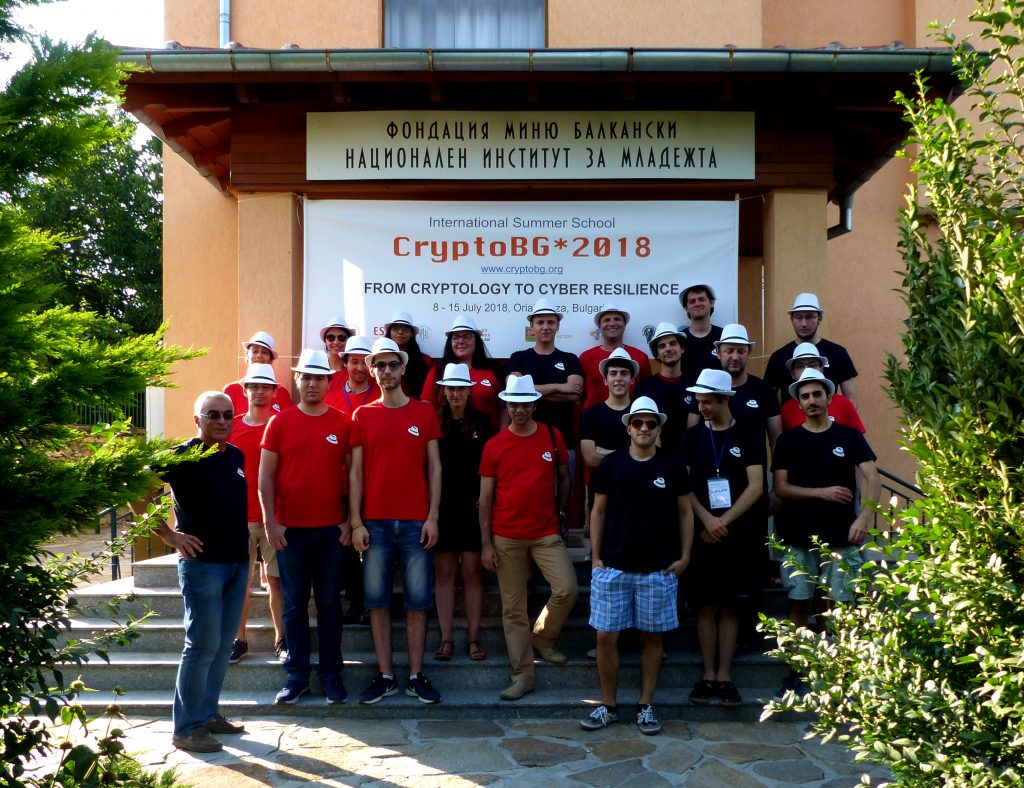The Race for AI2.0 in the world of data analytics, revealing the mysteries of quantum computing, deploying cryptography at full speed, and unraveling the future of the Bulgarian IT job market… These are just a few of the topics that the lecturers of the 2021 edition of DEV.BG’s “All in One” conference will dive into for their audience.
Between August 27 and 28, the online event will gather tech experts, business executives, startup founders, and IT professionals from all domains for a series of lectures on the future of technology.
As a media partner of DEV.BG for the “All in One” conference, The Recursive introduces you to one of the keynote speakers at the conference – Dimitar Jetchev.
Dr. Dimitar Jetchev is the co-founder and CTO of Inpher – a computer software startup that has developed one of the first privacy-compliant computational platforms, used for data analytics and building machine learning models. The solution is vital for protecting the personal information of people during data analytics surveys. The XOR Secret Computing technology of Inpher has been included in Amazon Web Services Marketplace, allowing users to perform analysis on data sources, containing private or sensitive inputs.
Jetchev is also an Affiliate Professor at the Swiss Polytechnique Federal Institute in Lausanne, where he teaches courses in mathematics and mathematical cryptology. He co-founded the International Summer School CryptoBG. In 2012, he was awarded the Bulgarian “John Atanasoff” Presidential Award for distinguished scientists.
In this interview, we discuss the secret computing market and Inpher’s development, the missing link between Bulgarian academia and the local tech ecosystem, and the importance of tech conferences for inflicting a cultural change in the country.
The Recursive: Tell us more about Inpher and its cryptographic secret computing technology. What is the problem Inpher solves?
Dimitar Jetchev: The company is solving the problem of collaborating on private data. In the industry, it is very difficult when you have segregated private data sources to aggregate them together into the data analytics or the computation service statistics that you want to compute. It is also common that a data analyst is interested only in the final result of the analytics, and should not see individual private data sources. That is why Inpher started by developing advanced cryptographic technology that allows multiple parties owning private data sources to collaboratively compute public functions on these data sources. The solution enables a variety of privacy-preserving computations and data analytics including computing basic statistics, training machine learning models, and predictions with already computed models. The need for such a solution is growing rapidly with the rise of GDPR.
What is the core technology behind your solution and what are the challenges connected to deploying it?
Inpher’s solution is based on two cryptographic methods developed over the past 20 years – Secure Multi-party Computation (SMPC), and Fully Homomorphic Encryption (FHE). A major difficulty of building a scalable product around these two technologies is putting expertise from different areas of Computer Science to develop such a solution.
The core technologies are not sufficient for building a fully functional product. One needs development tools for automation and deployment since the infrastructure for performing such a computation is very complex. We also need to deploy virtual machines on every client that owns private data needed for the analytics. In addition, special servers are necessary for synchronizing and orchestrating the computations. The solution requires random number generators and special-purpose compilers as well. All of these technologies have to be built in addition to the core cryptographic technologies to develop a scalable and user-friendly product accessible to a wider audience of data scientists. Overall, we should not assume that the data scientist is familiar with any of the cryptographic methods and parameters.
Which niches is secret computing technology going to enter in the near future?
Healthcare and fintech are two top industries where analytics are computed on sensitive data, so these are the major fields I expect secret computing to be more massively adopted.
When it comes to the fintech industry, typical use cases of privacy-preserving data analytics include building financial fraud detection models using transaction data from different institutions that cannot be shared, creating credit scoring models based on data from different financial institutions, analysing credit history, and others.
There is interest in our solution from different parties – pharma companies are interested in using the technology for clinical trials along with various biomedical research institutions. If you are building a complex neural network model using data from multiple private data sources such as personal devices, hospitals, or other institutions, you need to extract personal data without seeing the details of the patients, to comply with the GDPR requirements.
Advertisement is another field where it will enter, especially when it comes to marketing research.
What is the main obstacle on the way to the massive deployment of Secret Computing?
Education of the market. Whoever provides such technology should not only think about just bringing it to the market but also providing the necessary educational tools. Secret Computing is a novel concept and as such, it is changing the entire data flow in developing machine learning algorithms on sensitive data.
How has the local IT industry developed and what is it missing?
There have been a lot of positive developments since I left the country. Bulgaria is clearly a source of incredible talent in the space of IT and software development. It is an attractive place for any company. I think what is missing and still needs to be developed are the strong links between academia and the local software industry. Academia specializes in fields, such as computer science, mathematics, cryptography, advanced machine learning, distributed systems, compiler programming languages, anything that goes into a complex product like Inpher. It has the knowledge to offer to the ecosystem, yet joint development efforts are currently missing. I think we need to do very targeted work to enforce a culture of collaboration – developed countries, such as Switzerland have successfully established such a model. This means that both companies and academia should be more open. The industry has the power to turn top-level academic research into technology, into real-life products.
How can different actors work towards creating such a collaboration?
This will require a multi-step process. The first step is becoming aware of the missing link. For the problem to be solved, the ecosystem needs government support that stimulates the interaction between academia and the local technology sector. By all means, all parties need to understand the value-added by deep tech, then come up with a shared strategy on how to commercialize it through cooperation.
The ecosystem should allow academic research to easily spin off into startup companies. We need venture funding for these startups. At the same time, academia needs to focus its output (the academic research) to solve well-defined market problems in the ecosystem. A lot of people in academia make the common mistake of pushing a particular technology to the market without properly validating the market or customer need. It does not work this way. You need to extract the problem from the market and only then apply your expertise to solve it. If scientists communicate the market problem with key market players and propose a solution based on the technology that you use for this particular problem, it can work much better.
What is also important is that there is proper entrepreneurial education for academic researchers who are interested in commercializing technologies. Academic researchers need to know how to develop a business plan, estimate the available market size, formulate a unique value proposition as well as use the proper marketing tools, to bring the technology to market. They need to master the art of building and aligning teams on a unique vision and explain the idea behind their solution in a simple way to the outside world. They need to know how to fund a company. All this experience is something that you need to learn. . Overall, the local ecosystem needs to establish a culture of stimulating entrepreneurial education.
As far as the industry is concerned, it needs to be receptive to deep tech. Investors should be patient – they must know that when they put their investments into a deep tech company, they cannot have a very quick return on investment, yet, they should actively support the companies in the commercialization process.
What is the story of Crypto.BG and the most important lesson you learned there?
I noticed that the area that I was working in – cryptography and privacy – was an area of interest. People did not have enough access to top-level technologies in academic research there. So we started this initiative jointly with the foundation of Professor Minko Balkanski and Dr. George Sharkov more than 10 years ago. Crypto.BG created a community, and, to be very honest, a lot of the initial ideas of Inpher were essentially developed during Crypto.BG. I was happy to see that it was a format that brought together a lot of people from industry and academia, a group of highly motivated and skilled young IT professionals in Bulgaria. This strengthened my belief that we can change the ecosystem but I think we have a lot of work to do to achieve this. This has to happen incrementally with the correct vision and planning, but I am rather optimistic.

The 2018 cohort of Crypto.BG, ©Crypto.BG
Why did you agree to become one of the lecturers at the Big Conference?
It is one of the forums that could actually change the Bulgarian entrepreneurial culture and bring together first-class, technology, and actual software developers. It is a forum that is diverse and explains the logic behind every solution, technology, or method. DEV.BG is a forum where all of these technical problems that Inpher is solving as a company can be communicated among the same group of people. I also believe that it is the place to show examples of how deep tech can be commercialized – something that I feel a lot of people want to see in Bulgaria. At the same time, it is a great networking event for Bulgarian developers.
I think the conference is exactly the right forum for starting to build this culture of collaboration between software developers, and academia.
What should we expect to hear from you during the conference?
My goal of this lecture is to tell the story of Inpher and give a bit more technical as well as business context, show some of the use cases, and the technology at a general technical level, comprehensible by the general technical audience so that everybody can get something out of the story of our company. Most importantly, I want to motivate and emphasize why such a solution is important and what business value it brings to the markets.








